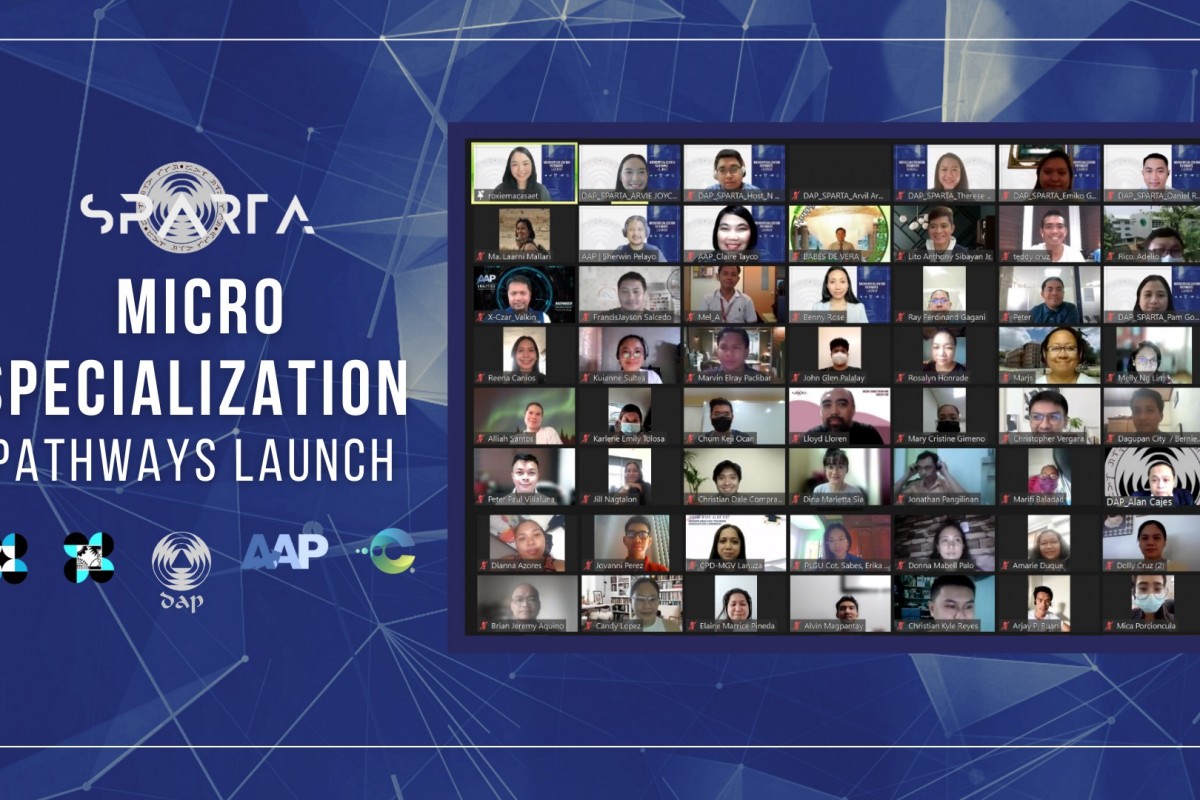PASIG CITY -- Project Smarter Philippines through Data Analytics, Research and Development, Training, and Adoption (SPARTA) launched its 11 Microspecialization pathways in June via Zoom, Facebook, and Youtube to allow scholars to further upskill themselves in analytics.
The new tracks allow SPARTA learners to study another aspect of Data Science and Analytics (DSA) to complement their main pathways within a shorter learning period while still equipping themselves with the proper skill sets.
The Microspecialization Pathways are the following: Domain Knowledge: Analytics Project Management; Domain Knowledge: Finance and Risk; Domain Knowledge:Human Resources: Domain Knowledge: Urban Planning; Data Governance; Operational Analytics; Data Visualization; Research Methods; Statistical Techniques; Computing; and Methods and Algorithms.
Development Academy of the Philippines Vice President and SPARTA Project Lead, Dr. Alan S. Cajes, opened the virtual event by recognizing that the program has scholars who are extremely passionate about analytics. Cajes said that because of this, “gusto namin kayong bigyan pa ng mas maraming opportunities para ma-improve ang inyong skills at mas i-explore ang DSA sa pamamagitan ng aming Microspecialization pathways.”
He encouraged the scholars to take advantage of the new tracks saying: “isang paraan upang mas maintindihan ninyo ang inyong piniling main pathway at kasabay naman nito ay makakuha rin kayo ng certificates para mas mapaganda ang inyong credentials.”
SPARTA coordinating agency Analytics Association of the Philippines’ Executive Director Sherwin M. Pelayo, on the other hand, explained the rationale behind the roll out of the new pathways. He said that the scholars now have the option to select a competency that they particularly need. He added that the new pathways will give scholars a different advantage as they are equipping themselves with the skills needed by their respective organizations to become more data-driven.
SPARTA Curriculum Lead Frances Claire S. Tayco then discussed the objectives of the 11 tracks, and detailed the courses needed to gain a certificate from each one. While scholars can choose any Microspecialization track regardless of their main pathway, Tayco noted which of the new tracks supplement the existing six main paths to further aid scholars in their learning.
Coursebank, also a SPARTA cooperating agency, upgraded its platform ahead of the launch. Course Development Head Benny Rose Ubas explained the new enrollment process, which now has a self-enroll mode. This is a new feature that no longer requires scholars to wait for enrollment codes to be generated before they can enroll in their chosen courses.
Another development announced during the virtual event was the release of new certificates for scholars who completed courses or the Microspecialization pathways.
SPARTA Information Officer Arvie Joyce Cayabyab demonstrated the process of generating the new signed certificates. Pelayo, Ubas, and Tayco addressed questions from the participants during the open forum.
Pelayo, in closing remarks, highlighted the great learning environment in SPARTA where scholars and the team learn from each other. He cited the creation of the Microspecialization pathways as an example of how the project adjusts to its scholars’ needs because the shorter tracks were designed from the feedback gathered from surveys and focus group discussions.
Amid questions about the possible extension of SPARTA, Pelayo urged everyone to adopt the mindset that the project will end on 14 November 2022. He shared that it is crucial for the scholars to self-evaluate in order to find out the skills they needed and if they can commit to a main or a microspecialization track. He advised existing scholars to find time and try their best to complete their pathways and for the non-scholars to grab the opportunity to enroll in the program. (DAP-SPARTA)



